#igbo-ukwu
Explore tagged Tumblr posts
Photo
In the Encyclopedia of Clothing and Fashion (2005), Leslie W. Rabine describes the boubou as:
“the classic Senegalese robe, worn by both men and women all over West Africa and in West African diasporic communities of Europe and the United States. Sewn from a single piece of fabric, the boubou is usually 59 inches (150 cm) wide and of varying lengths. The most elegant style, the grand boubou, usually employs a piece of fabric 117 inches (300 cm) long and reaches to the ankles. Traditionally, custom-made in workshops by tailors, the boubou is made by folding the fabric in half, fashioning a neck opening, and sewing the sides halfway up to make flowing sleeves. For women the neck is large and rounded; for men it forms a long V-shape, usually with a large five-sided pocket cutting off the tip of the ‘V.’ When stiffly starched and draped over the body, the boubou creates for its wearer the appearance of a stately, elegant carriage with majestic height and presence. Men wear the classic boubou with a matching shirt and trousers underneath. Women wear it with a matching wrapper or pagne and head-tie.”
This traditional blue indigo-dyed boubou (Fig. 1) is decorated with geometric and figural embroidery which shows the prestige and importance of the wearer. These Islamic motifs were for protection and this boubou was only worn for special occasions.
In the Berg Encyclopedia of World Dress and Fashion: Africa (2010), Babatunde Lawal explains a possible origin for the boubou:
“It has been suggested that the Berbers/Tuaregs from North Africa might have introduced some of these robes and trousers to western and central Africa in the course of the trans-Saharan trade that started before the Christian era and lasted until the late nineteenth century. Some of the earliest evidence of the flowing robe in sub-Saharan Africa comes from a ninth-century c.e. burial site excavated at Igbo-Ukwu in eastern Nigeria.”
This indigo-dyed cotton robe (Fig. 2) is a single piece of fabric which creates the flowing drapery on the body. There is a slit in the center where the wearers head goes through then the rest of the fabric drapes down.
The boubou can also be designed with patterns and imagery. This boubou (Fig. 3) includes alternating strips of fabric sewn together. Both fabric sections are indigo dyed, one being light blue and the other being dark to create a contrasting striped pattern. Around the squared neck hole is geometric hand-sewn embroidery in red, white, brown, and black.
While traditionally a robe for men, in the twentieth century women also began to wear a version of the boubou, as Lawal notes:
“Women sometimes wear a loose blouse or robe (called boubou in Senegambia and Mali) on top of their wrappers.”
In the Berg Encyclopedia of World Dress and Fashion: Africa (2010), Hudita Nura Mustafa explains the complexity of the boubou:
“While building upon enduring forms and values, dress also possesses a fertile capacity to evolve. For example, billowing boubous, robes of six meters (twenty feet), simply cut and often richly embroidered around the neck, are recognized the world over as traditionally West African. Yet the boubou is not a static symbol of origin but an object of dynamic dialogue between tradition and modernity, hybridity and authenticity. It was further spread by Islamization in the nineteenth century and, while the basic form stays constant, it has its own fashions.”
Mustafa further elaborates:
“Although the basic categories of dress are traditional/African and modern/European, the diversity of styles transcends this opposition. These categories are symbolized in the French suit, the attire of the civilized black Frenchman, and the embroidered boubou, the attire of the traditional Muslim man. The embroidered boubou is, and has always been, the pinnacle of prestige. African dress is associated with religious and traditional ceremonial events, domestic space, and modesty.”
This cotton boubou (Fig. 4) made for a man is embroidered with red, white and blue wool has a squared neck opening for a more masculine effect. The length of this boubou is more conservative and not particularly long and the geometric designs depicted across the front and back show how customizable this garment is.
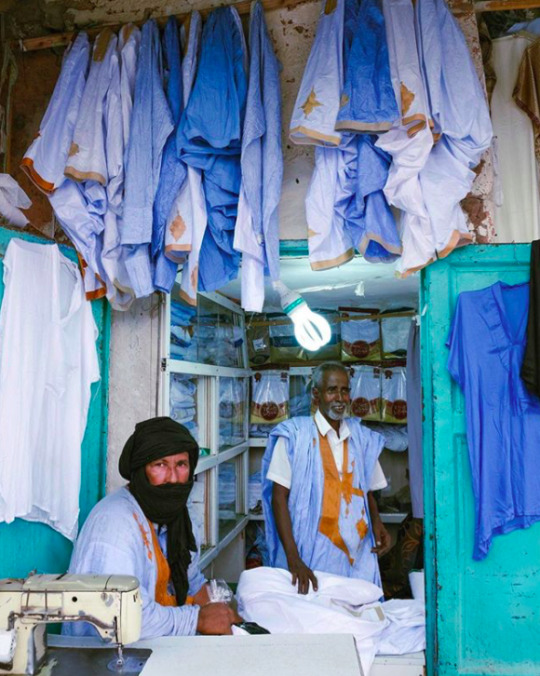
Boubou tailors in Nouakchott, Mauritania.
Instagram: ricci_s
#studyblr#history#archaeology#trade#commerce#clothing#burials#mauritania#senegal#amazigh#tuareg people#nigeria#anambra state#nouakchott#igbo-ukwu#leslie w. braine#babatunde lawal#hudita nura mustafa#trans-saharan trade#to read
107 notes
·
View notes
Text
Vase with Rope from Igbo-Ukwu, Nigeria, c. 9th–11th century C.E.
The bronzes from Igbo-Ukwu have garnered much attention from scholars due to their intricate designs and symbolism as well as the technical virtuosity required to create them. Many of the bronze objects uncovered at Igbo-Ukwu are skeuomorphic, including the Vase with Rope. In this object, the artist skillfully imitated the appearance of a slender ceramic vase, decorated with relief designs and…
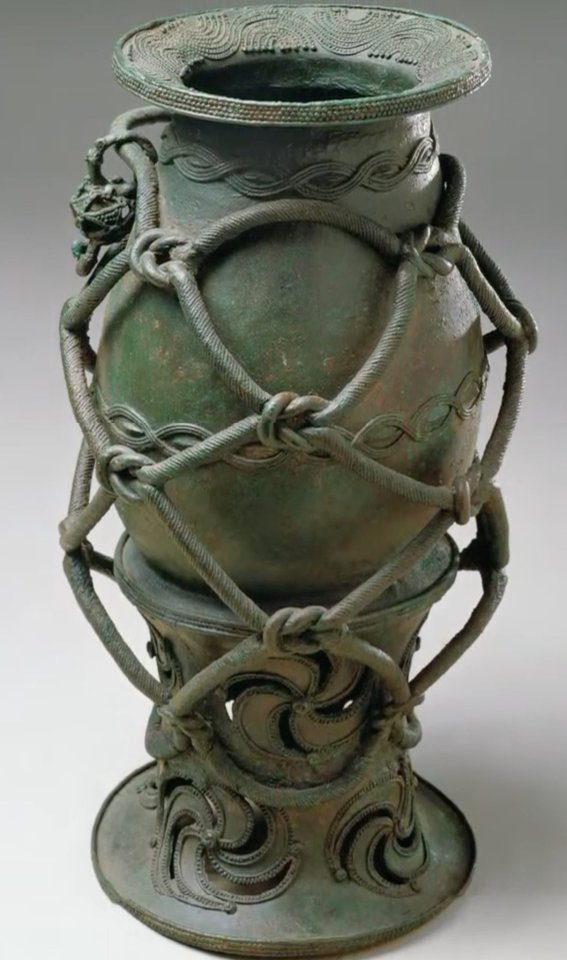
View On WordPress
#African artifact#African History#Igbo Bronze Vessel#Igbo History#Igbo-Ukwu#Vase with Rope from Igbo-Ukwu
2 notes
·
View notes
Text
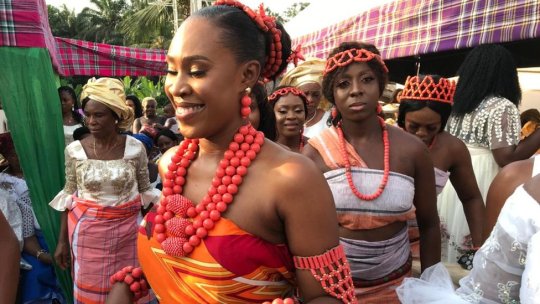
Igbo-Ukwu Archaeology
Glass production: Igbo-Ukwu has one of the oldest glass productions in West Africa. The archeology of Igbo-Ukwu had over 600 prestige objects including complex cast copper-alloy sculptures and more than 165,000 glass and carnelian beads. The most common glass among the 138 analytical results for Igbo-Ukwu beads is soda-lime glass produced using plant ash.Glass beads from Igbo-Ukwu
Igbo-Ukwu is a historically significant archaeological site located in southeastern Nigeria, in what is now Anambra State. The site is renowned for its remarkable discoveries of ancient artifacts that date back to the 9th and 10th centuries AD. The archaeological findings at Igbo-Ukwu have provided valuable insights into the early history and cultural achievements of the Igbo people and their interactions with other civilizations in the region. The artifacts may be associated with the traditional Kingdom of Nri and its priest-king, the Eze Nri.
The significance of Igbo-Ukwu lies in the following aspects: Sophisticated Artifacts: The excavations at Igbo-Ukwu revealed a collection of highly sophisticated and elaborately crafted artifacts, including intricately designed bronze, copper, and iron objects. These artifacts demonstrate the advanced metallurgical skills of the ancient Igbo people and their ability to work with various metals.
The Igbo-Ukwu artifacts predate certain other well-known Nigerian bronze sculpture traditions such as those of Ife and the Benin Kingdom and have contributed to our understanding of the development of metallurgical techniques in Africa.
Cultural Exchange and Trade: The presence of exotic materials like glass beads and imported ceramics at the Igbo-Ukwu site suggests that the people of Igbo-Ukwu were engaged in trade and had connections with other cultures and civilizations, both within and outside of Africa.
Evidence of Social Complexity: The intricate and finely crafted artifacts found at Igbo-Ukwu suggest the existence of a sophisticated and socially complex society. The level of craftsmanship and the variety of artifacts indicate the presence of skilled artisans and a hierarchical social structure.
Influence on Igbo Art and Culture: The artifacts discovered at Igbo-Ukwu have had a profound impact on the understanding and appreciation of Igbo art and culture. They have inspired contemporary Igbo artists and craftsmen and contributed to a sense of cultural identity and heritage.
Recognition of African Achievements: The discoveries at Igbo-Ukwu challenged the outdated notion of Africa as a continent with no significant history or cultural achievements. The site's findings have demonstrated the richness and complexity of ancient African civilizations. The archaeological site of Igbo-Ukwu was first discovered in 1939 when a group of villagers accidentally came across the artifacts while digging a trench. Subsequent excavations conducted in the 1950s and 1970s uncovered a wealth of cultural treasures. The Igbo-Ukwu artifacts are now housed in various museums, including the Nigerian National Museum in Lagos.
Overall, Igbo-Ukwu remains a vital archaeological site that continues to contribute to our understanding of ancient African civilizations and their contributions to human history. 9th Century Igbo-Ukwu face pendantDouble egg pendant, leaded bronze, 9th-10th century, unearthed in Igbo Ukwu, AnambraBronze ornamental staff head, 9th century, Igbo-Ukwu
Glass production: Igbo-Ukwu has one of the oldest glass productions in West Africa. The archeology of Igbo-Ukwu had over 600 prestige objects including complex cast copper-alloy sculptures and more than 165,000 glass and carnelian beads. The most common glass among the 138 analytical results for Igbo-Ukwu beads is soda-lime glass produced using plant ash.

#african#afrakan#kemetic dreams#africans#brownskin#afrakans#brown skin#african culture#igbo#ukwu#anambra#west africa#igbo culture#igbo history#afrakan spirituality
59 notes
·
View notes
Text
— open starter.
status - open to all, but pls read my rules and mobile about (pinned post) first before interacting. don't like my starters. muse - iesha saeng-ah seol, adjunct professor of law/licensed attorney with private practice. bisexual, uses they/she/xe pronouns. vampire, six hundred and sixty-nine, appears twenty-nine. can default to appearance age/5+ for non-supernatural thread (if applicable). tag linked in source. wanted opposites - m/f/nb, 30+. mocs (muns/muses of color) preferred. wanted connections - colleague, friend, date they've been seeing for a couple times, that one bitch who's supposedly from a line of vampire hunters but has never actually seen an honest to fuck vampire in their life, etc, as long as it's not taboo give me all of your shit. plot - you were supposed to be discussing international law and cases and shit but it's a Sunday evening and you're at their house and now they're calling bullshit on the 'garlic repels vampires' folklore after cooking you something from the family heirlooms that you swear to God is not even an extant dish and plying you with wine???? really good wine at that???? or maybe you don't drink that's fine here just have more food and hey is it just you are they fucking with you for fun or are their canines a little longer than usual. well

— there's only so long someone can talk about trade laws and governmental disputes before their soul looks like it's fixing to crawl halfway out of their body and into the open arms of God, so they're not surprised when the conversation takes a less... formal tone after the meal. vampires, though. their weaknesses, specifically. that's one for the books. they wouldn't have pegged the other as being even vaguely interested in poking around things older than law itself. there is the arch of an eyebrow, then, hovering, the slightest tell as they listen to them continue—curious, how invested this one seems to be in what to normal people is only a hypothetical. curious, how easy it is to figure out how much of it this one thinks is not. 'mean no disrespect, love, but listen to yourself,' they interrupt, wine glass in hand, half lounged over the back of the leather sofa like a cat sunning itself in the light of the open window, ceiling to floor. of course, it's pitch fucking black outside and it's Sunday night so there is no sunning to be had, but they'll never miss the opportunity for a good comparison. (the 1975 Léoville-Las Cases vintage still decanting in the glass doesn't hurt.) 'they've said this shit for years and i've heard it all. i've been all over the fucking world, toured the west coast of Africa twice, studied in France for nine years to get my degrees'—they don't linger on that part, because if the other thinks for too long and starts calculating shit they'll realize that xe'd have to be a fucking genius to head to Europe fresh out of xir teens and still wet behind the ears—'if garlic was really the undead's kryptonite i'd have a three story penthouse and a chauffeur waiting for me in hell at this point, the amount of things i've eaten. tonight included.' xe lean over a little further, soft haze of the chandelier above xem. 1950s, vintage Murano glass, Barovier & Toso mounted flush against the ceiling, light from the corners glinting off of the edge of a fang. veneers, on a cursory glance, unless you knew what you were looking for. 'you know what i think? i think someone got pissy they couldn't eat garlic and passed it off as a vampire problem, and then never had to eat another clove of garlic in their life as a result because they were too busy making money off the rumors by selling it as a magic charm or some shit like that.' or, they were a vampire and just wanted to fuck with humans for the fun of it, she thinks, but who would she be if she gave up trade secrets just to catch the hint of another smile from her guest. terribly unprofessional, according to eomma. then again, professionalism is not what gets you a custom engraved stake to the heart on chuseok. missed by three inches, albeit, but eomma is not one to measure distance, just audacity and the nicely healed scar on her chest. no respect for the ancients, these days. // @indiestarter
#* open starters.#( * starters - iesha. )#( * threads - iesha. )#indie rp#indie oc rp#indie bi rp#independent rp#indie starter#open starter#( * me writing about wine vintages and pulling up research while i'm under the US drinking age.............. the irony does not escape me#| had too much fun with this tho the lore is that in the main verse [supernatural] both Iesha's parents are 1. vampires and 2. super#| f*cking old ones. her mom's been around since the Shilla kingdom and her dad. well. haven't really seen him in 300 years give#| or take but he's been first tracked back to the heydays of the Ghana empire/the Igbo-Ukwu site in Nigeria. he's a little older ofc they#| just don't have tangible records of him before that. as for the assassination attempt xir mom is very offended that they didn't even#| try and get a proper stake to stab her [the mom] with bc the Buddhist prayers engraved on there are fake which means someone didn't#| do their due diligence. if you're going after a vampire descended from Buddhist monks that's an insult sksksksk#| unlike Vasti however Iesha WILL in fact bite. they have teeth especially for that but they'll ask first before yk. everything.#| i love them your honor )
2 notes
·
View notes
Text
Hardship: Why Igbo shunned nationwide protest — Ukwu, Ameh, Igbo Elders
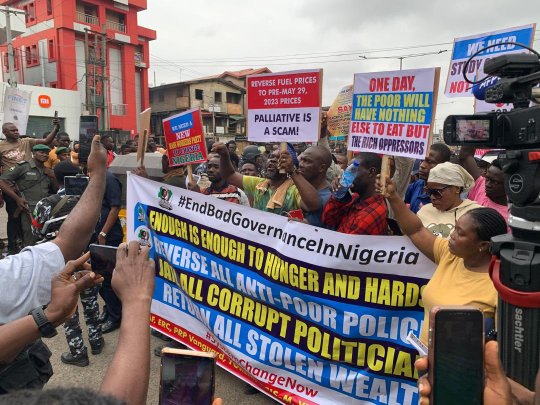
It is no longer news that Igbo, especially in the five Southeast states, did not participate in the End Bad Governance protest that started in other parts of the country on August 1. However, why the Igbo shunned the protest and the implications for the country are raising issues in the polity. Nwaiwu, It is no longer news that Igbo, especially in the five Southeast states, did not participate in the End Bad Governance protest that started in other parts of the country on August 1. However, why the Igbo shunned the protest and the implications for the country are raising issues in the polity. Across other parts of the country, angry protesters stormed the streets and for more than five days vented their spleen against what they described as bad Governance, hunger and hardship in the country. The protest became riotous in the North as hoodlums looted shops, and business centres among others. Many states declared curfews to contain the mayhem. But there was pin-drop silence in the South-East leading many to ask if the zone and Igbo are insulated from the prevailing economic downturn in the country. Ameh fingers inequity, injusticeSpeaking on the issue, Chief Peter Ameh, former Presidential candidate and national secretary of the Coalition of United Political Parties, CUPP, said the “absence of equity, justice and fairness is the reason for the political apathy by Igbo in the Nigerian project. ”According to him, “constant and unjust scapegoating of the Igbo ethnic group in Nigeria is the major reason why Igbo abstained from the nationwide protests.” He continued: “Failure to implement General Yakubu Gowon’s Reconstruction, Reconciliation and Rehabilitation programme is a catalyst for growing lack of commitment by all persons of Igbo extraction within and outside Nigeria in many programmes of the government. ”Chief Ameh also attributed Igbo boycott of the protest to “marginalisation of Igbo in strategic economic and administrative positions under the APC governments, and acts of tribal exclusion mixed with political bigotry.” He continued: “The main reason why the entire Southeast geopolitical zone of Nigeria was unanimous in their decision not to participate in the ongoing #EndBadGovernanceInNigeria protest across the country is primarily as a result of the easy targeting of lives and property of Igbo whenever there is an uprising or protests in Nigeria.“ Being the only tribe in Nigeria that could be found and visibly seen in the remotest parts of the country, Igbo are always at the receiving end of the consequences of any activity carried out either by the Nigerian government or the public. Read the full article
4 notes
·
View notes
Text
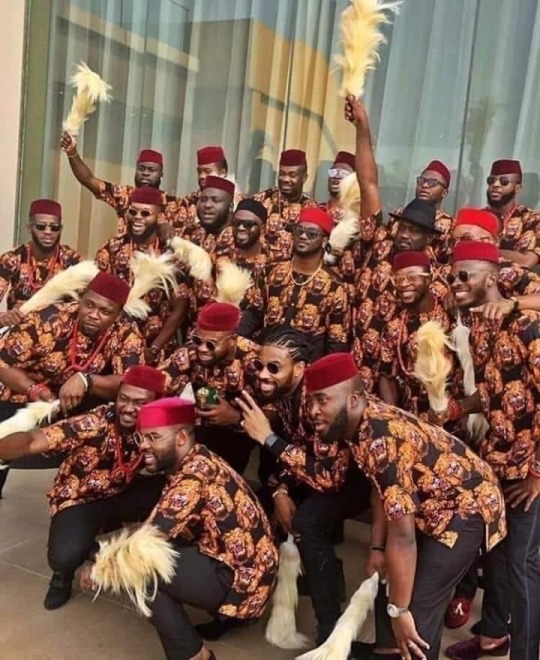
ORIGIN AND MEANING OF THE NAME IGBO
The meaning of the name Igbo has been a subject of debate and speculation among many people. There is no consensus on its true meaning.
Firstly, it is important to note that the names of ethnic groups are not always derived from within those groups. For example, the Yoruba people used to refer to themselves as the anago or the aku people, and the name Yoruba was given to them by the Hausa people, which supposedly means someone who is tricky or untrustworthy. However, this is just an example and not our main focus.
Regarding the name Igbo, many have suggested that it comes from Heebo, Eboe, or Ibo. However, this is a false narrative driven by an agenda to draw similarities to Hebrew. It is important to note that no Igbo clan, town, or tribe refers to themselves or others as Ibo, Mr Ibu, Heebo, or Eboe. These terms were first encountered in colonial texts or documents by Portuguese or British explorers and cartographers. The transcriptions of Igbo names were based on how they sounded to these foreigners, taking into consideration their own linguistic rules. As a result, it is easy to transcribe Igbo into Heebo or Eboe, but this does not reflect the true linguistic structures of the Igbo language.
Elevating a western corruption of the native Igbo tribe to a factual and legitimate status is illogical and mischievous. The names Heebo, Eboe, and Ibo are all Western corruptions of Igbo and hold no meaning to the indigenous people. Additionally, attempts to link Igbo to Hebrew through fabricated synonyms such as Igbrew or Hibu are baseless and lack factual support.
The name Hebrew itself is an English corruption of the original Ivriyyim. Many English corruptions have resulted in false similarities, such as using the word Jew instead of the original Hebrew word Yahudi, or Judah instead of Yahuda. It is important to correct these corruptions to truly understand the original Hebrew language.
Some have tried to link Igbo to gboo, suggesting that Igbo means ndi gboo, which translates to ancient people. Although this seems more credible than previous examples, ndi gboo simply means "ndi gboo" and ndi Igbo means ndi Igbo. They are not the same. Furthermore, many parts of Igbo land use different terms like Oche, Ochie, or Akani/Okani to refer to ancient. If it was "ndi gboo," it would have been gboo people, not Igbo people. The etymology and intonation of gboo and Igbo are distinct.
When considering the origin and meaning of the word Igbo, there are three etymologies that give it meaning. These meanings can be found locally without misspelling the word. The first etymology suggests that Igbo originated from a proto-Kwa word meaning "forest" or "forest people," as they were among the first proto-Kwa people to settle in the rainforest area and assimilate the indigenous Pygmy population.
The second etymology suggests that the tribes who settled by the riverbanks referred to the interior tribes as Igbo, indicating those who lived in the interior forests. The hinterland tribes referred to them as oru/olu.
To fully grasp the composite meaning of Igbo and why it became the name of the ethnic group, we must consider the third etymology. Igbo simply means the community or the people of the community. This term was commonly used in the past but has become obsolete, replaced by more commonly used terms like oha, except in certain areas where archaic dialects are still maintained. Igbo is an old usage that signifies the community or congregation of the people. Understanding this sheds light on expressions like "Igbo Nsukka" and the names of communities such as Igbo Etiti, Igbo Eze, Igbo Ukwu, and Igbo Uzo. Over time, it evolved into an ethnic identity, eventually encompassing Oru as well.
7 notes
·
View notes
Text
Chukwu - Wikipedia
Many Igbo dialects refer to The Almighty by titles such as "Chukwu" (Chi Ukwu), "Chineke" (Chi Na Eke), "Chukwu Okike" (Chi Ukwu Okike), "Chiokike" (Chi Okike), "Chuku" (Chi Uku), "Ebili Ukpabi" (Ebili nu Ukpabi), and "Obasi"** (Obi Alusi).[3]
MI6
0 notes
Text
Igbo-Ukwu Celebrates its Heritage: Book Launch Highlights the Cradle of Igbo Civilization
Aguata- Igbo-Ukwu Community Aguata Local Government Area of Anambra State, known for its historical and Cultural significance in Igboland has taken a major step towards reaffirming its status as the cradle of Igbo civilization with the Public presentation of a Book titled,”Igbo-Ukwu: The Igbo Cradle. The event which was held in Amaehulu Town Hall, Igbo-Ukwu brought together Historians and the…
0 notes
Text
Exploring Nigeria’s Rich Traditional Art Cultural and Creative Arts JSS 3 First Term Lesson Notes Week 1
Subject: Cultural and Creative Arts Class: JSS 3 Term: First Term Week: 1 Age: 14-15 years Topic: Nigeria Traditional Art Sub-topic: Definition and Types of Traditional Art Duration: 60 minutes Behavioral Objectives By the end of the lesson, students should be able to: Define traditional art in Nigeria. Identify different types of traditional art, including Nok, Igbo-Ukwu, Ife, and…
0 notes
Text
9th-Century Igbo Bronze Vessel In The Form of a Snail Shell
The 9th-century bronze vessel in the form of a snail shell, excavated in Igbo-Ukwu, Kingdom of Nri, in present-day Nigeria, stands as a testament to the remarkable ancient bronze metal-working culture of the region. The archaeological significance of Igbo-Ukwu is underscored by the discovery of three distinct sites, where excavations have revealed a trove of sophisticated bronze artifacts dating…
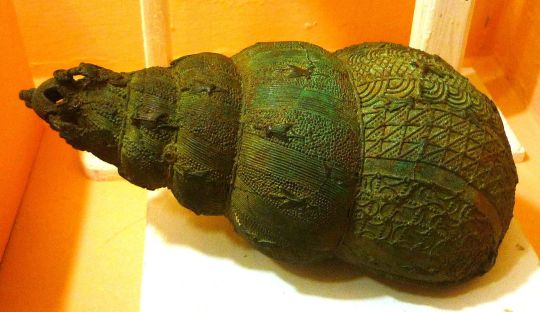
View On WordPress
#African Art#African artifact#African History#Igbo Bronze Vessel#Igbo History#Igbo-Ukwu#Kingdom of Nri#West African#West African history
2 notes
·
View notes
Text
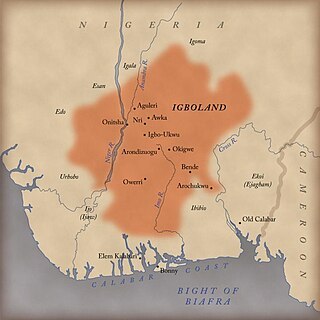
Kingdom of Nri
The Nri people of Igbo land have a creation myth which is one of the many creation myths that exist in various parts of Igbo land. The Nri and Aguleri people are in the territory of the Umueri clan who trace their lineages back to the patriarchal king-figure Eri.Eri's origins are unclear, though he has been described as a "sky being" sent by Chukwu (God). He has been characterized as having first given societal order to the people of Anambra. The historian Elizabeth Allo Isichei says "Nri and Aguleri and part of the Umueri clan, [are] a cluster of Igbo village groups which traces its origins to a sky being called Eri."
Archaeological evidence suggests that Nri influence in Igboland may go back as far as the 9th century, and royal burials at the Igbo-Ukwu sites have been unearthed dating to at least the 10th century. Eri, the god-like founder of Nri, is believed to have settled the region around 948 with other related Igbo cultures following after in the 13th century. The first Eze Nri (King of Nri) Ìfikuánim followed directly after him. According to Igbo oral tradition, his reign started in 1043. At least one historian puts Ìfikuánim's reign much later, around 1225 AD:
Each king traces his origin back to the founding ancestor, Eri. Each king is a ritual reproduction of Eri. The initiation rite of a new king shows that the ritual process of becoming Eze Nri (Nri priest-king) follows closely the path traced by the hero in establishing the Nri kingdom.
An Igbo man with facial scarifications, known as ichi, early 20th century
The Kingdom of Nri was a religio-polity, a sort of theocratic state, that developed in the central heartland of the Igbo region. The Nri had seven types of taboos which included human (such as the birth of twins), animal (such as killing or eating of pythons), object, temporal, behavioral, speech and place taboos. The rules regarding these taboos were used to educate and govern Nri's subjects. This meant that, while certain Igbo may have lived under different formal administration, all followers of the Igbo religion had to abide by the rules of the faith and obey its representative on earth, the Eze Nri

#african#afrakan#kemetic dreams#africans#brownskin#afrakans#brown skin#african culture#nri#eze nri#kingdom of nri#igbo#ukwu#west africa#chukwu#Anambra#igbo religion#scarifications
61 notes
·
View notes
Photo
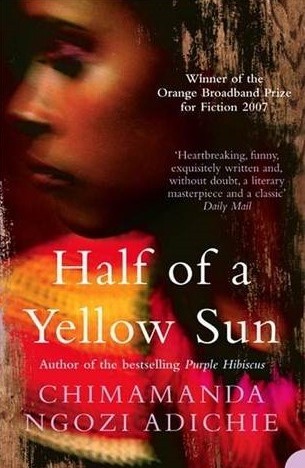
(via Half of a Yellow Sun by Chimamanda Ngozi Adichie)
Half of a Yellow Sun is a novel by Chimamanda Ngozi Adichie on Nigeria in the 1960s. It vividly portrays the struggles and tensions of the society in a nation that had barely started breathing in its nascent independence. The British had just left in 1960 leaving the country to be governed by its own people. However, the citizens are not united; there is a wide rift between the Northern and Southern regions as is often the case with almost any north-south geography. The North has tribes, mainly Hausa, Yoruba and the like, while the South and the East are predominantly Igbo people. The differences between the two communities are starkly pronounced.
Odenigbo and his partner Olanna are Igbos and teach in the Nsukka University in the South. Olanna’s sister Kainene oversees her father’s businesses in Port Harcourt, and lives with her English lover Richard who has come to Nigeria to research heritage arts, particularly Igbo-Ukwu art. The sisters come from an affluent family living in the richest area of Lagos, the largest city of Nigeria. Additionally, we meet Ugwu, Odenigbo’s houseboy, who initially appears insignificant, but keeps the plot moving as the author narrates the story in many places by describing the thoughts going on in his head tracing his observations and convi... (Read full text on booksperience.org)
#books#reading#chimamanda ngozi adichie#africa#african history#biafra#civil war#fiction#half of a yellow sun#hausa#history#igbo#kainene#nigeria#nigerian history#odenigbo#olanna#tribal sentiments#tribes#ugwu#yoruba#booksperience
1 note
·
View note
Text
400 widows benefit from NGO empowerement package in Igbo-Ukwu, Anambra state
400 widows benefit from NGO empowerement package in Igbo-Ukwu, Anambra state
No fewer than 400 widows from Igbo-Ukwu, Aguata Local Government Area of Anambra State and its environs have been empowered by Dona-Maureen Foundation, a Non Governmental Organization. The beneficiaries were empowered with free grants to enable them start up small scale businesses as well as bags of rice and condiments in the spirit of the yuletide. Speaking during the presentation, founder of…
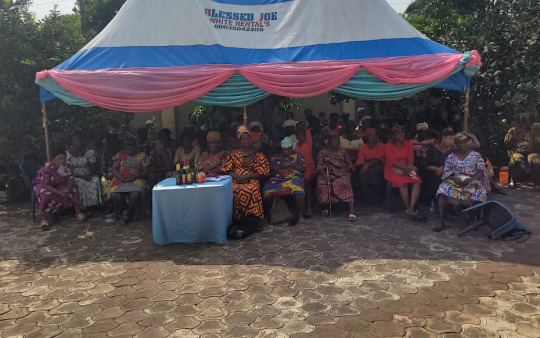
View On WordPress
0 notes
Text
Igbo Pottery: The Udu Drum
Igbo Pottery: The Udu Drum
How long has pottery been part of Igbo society? Pottery has been part of Igbo culture for centuries, with some of the earliest artefacts dating back to 2500 BC. The most well-known examples of Igbo pottery are the 9th-century findings from Igbo Ukwu, which include many ornate pieces. (Image Below: Globular vessel with everted rim, Igbo Ukwu, terracotta, 1000 BP) What is an Udu? An example of…

View On WordPress
#igbo#igbo pot#igbo pottery#igbo pottery history#igbo ukwu#nigeria#nigerian pottery#okwuid#the history of igbo pottery#the odoo pot#the udu of nigeria#udu
4 notes
·
View notes
Photo
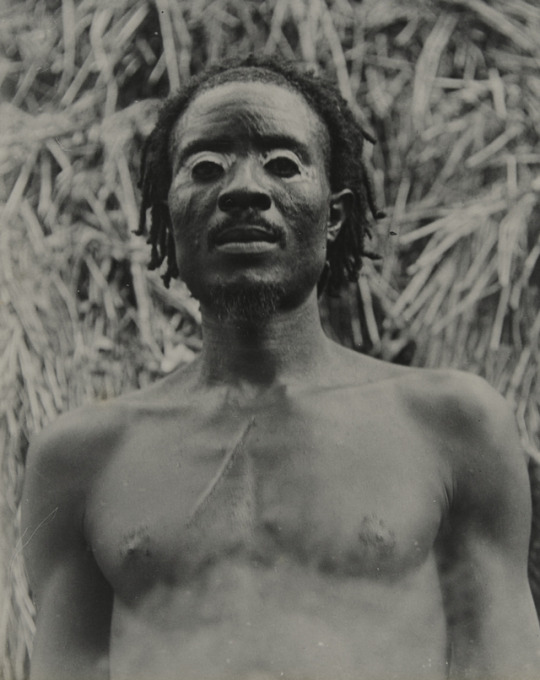
A man from Enugwu Ukwu in present day Anambra State, photographed by Northcote Thomas, c. 1910-11. MAA Cambridge. [There’s nzụ, chalk, on his eyes.]
248 notes
·
View notes
Text
Anambra: Speeding driver kills woman, dies
Anambra: Speeding driver kills woman, dies
The Federal Road Safety Corps (FRSC) on Sunday confirmed the death of a speeding driver and a female pedestrian at Obiuno Road in Igbo Ukwu community, Anambra State. Mr Andrew Kumapayi, Anambra’s FRSC Sector Commander told News men that the incident occurred on Saturday. Kumapayi said, “Eyewitness report reaching us indicates that an unidentified driver of a Lexus car with registration number…

View On WordPress
#Anambra State#Anambra’s FRSC Sector Commander#FRSC#Mr Andrew Kumapayi#Obiuno Road Igbo Ukwu community#The Federal Road Safety Corps
0 notes